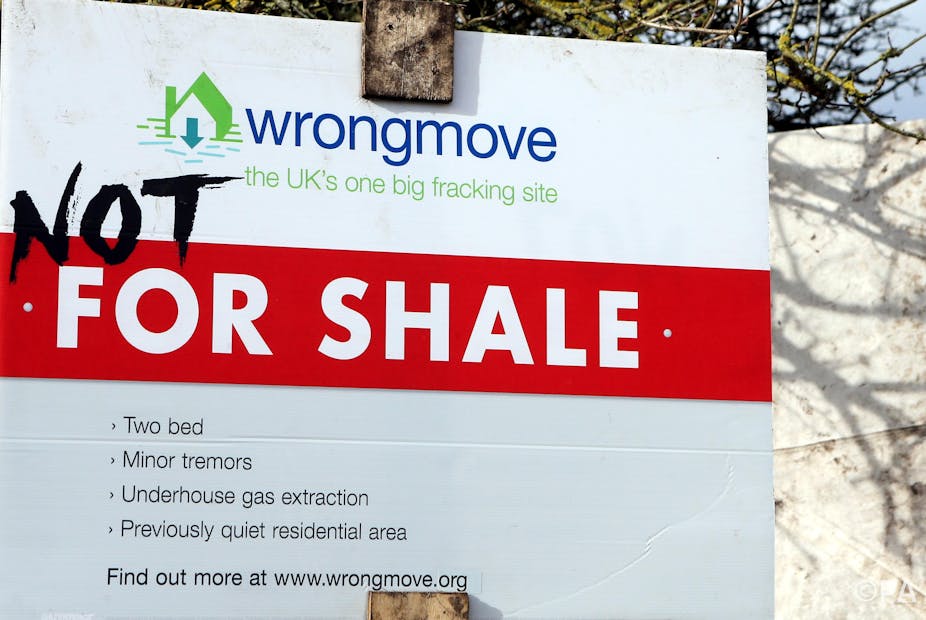There has been an anxious search for new sources of fossil fuels, and shale gas appears to offer Britain a key national resource. But the nation’s new-found hydrocarbon wealth has met with far from universal approval. The first company to be granted a licence to drill for shale, Cuadrilla, found itself in the Battle of Balcolme last summer as environmental activists and Sussex villagers clashed with police over the drilling site.
There are now only 12 months to go before a general election. With the coalition government keen to make the most of Britain’s reserves, public opinion of fracking could be important to the outcome of the next election.
Energy politics
Advocates describe shale gas as “game-changing”, able to radically reduce Britain’s reliance on imported fuel and cut household energy costs. But opponents state the process of fracking – blasting water underground at high pressure to shatter rocks and release gas – is risky and environmentally damaging with little-understood health risks.
Many Conservatives appear to be highly supportive of the “dash for shale”, while others worry about the voting implications of drilling in Tory shire county strongholds. Although Liberal Democrat leader Nick Clegg offered cautious support last year, prominent Liberal Democrats have distanced themselves. Labour’s position is more difficult to decipher, with elements of support and staunch opposition.
Former Conservative energy minister Lord Howell this week repeated his comments of last year that fracking should go ahead in the “desolate” north, avoiding at all costs the Tory strongholds of the southern counties. Evidently, the lack of consensus between and within the parties on fracking means that any dash for shale gas is some way off yet.
Framing fracking
As part of our project examing climate change as a complex social issue, my colleagues and I examined how the issue is framed socially and politically by looking at how fracking is presented in the British broadsheet press and in British public opinion polls.
Our analysis of the UK media’s reporting of fracking revealed occasions when it was heavily split between those against (The Guardian and Independent) and those for (The Times and Telegraph).
Reported in April 2011, the Gasland documentary film followed the experiences of residents affected by fracking in the US including memorable scenes of setting fire to gas-infused tap water. In April 2011, Cuadrilla’s fracking in Lancashire caused a seismic event. In both cases, a clear divide was seen, with pro-fracking outlets refering to “seismic activity” or “tremors”, and anti-fracking outlets referring to “earthquakes”, or rubbishing the facts or motives of the Gasland film.
The British public
We should not lose sight of public opinion among the rhetoric in the newspapers. My colleagues and I have been conducting survey research via YouGov in order to gauge the British public’s perceptions of fracking, conducting six large surveys since 2012.

Interestingly, respondents overwhelmingly endorsed fracking in Britain. But the trend of growing support for and declining opposition to fracking was reversed in July 2013, perhaps as a consequence of the considerable coverage of the altercation in Balcolme, and the strong explanations of the risks involved.
If it is the case that, on the whole, the British public is open to the prospect of fracking, why is this the case, and why are they supportive despite the representations of risk in the media?
I have argued that love of lifestyle may outweigh fears over fracking. Human beings generally resist change, try to maintain a sense of continuity and control. Fracking, with its promise of cheap, secure energy, may be viewed as a means to this end, with the risks downplayed. Of course, this is very much dependent on the sorts of messages found in the media and the mouths of politicians.
The future of fracking in Britain
What our work shows is that the way fracking is framed, socially, linguistically, ideologically, is pivotal in shaping the debate. These framings shape our risk perceptions and tell us how we should act, and can persuade us towards one position or another despite the potential risks or benefits.

Essentially, both the pro- and anti-fracking camps are engaged in a struggle of representation. While one camp constructs the practice of fracking as excessively risky, the other camp minimises, normalises and justifies the risks.
There is much political ambivalence about fracking, with no single major political party having taken a firm party-wide stance on the technology. However, with growing public endorsement, it may be the case that the major political parties will view fracking as something that the British public wants and, ultimately, will vote for.

